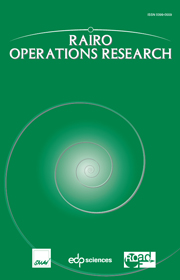Crossref Citations
This article has been cited by the following publications. This list is generated based on data provided by Crossref.
Makarenkov, Vladimir
2002.
Classification, Clustering, and Data Analysis.
p.
371.
Guénoche, Alain
Leclerc, Bruno
and
Makarenkov, Vladimir
2004.
On the extension of a partial metric to a tree metric.
Discrete Mathematics,
Vol. 276,
Issue. 1-3,
p.
229.
Makarenkov, Vladimir
Kevorkov, Dmytro
and
Legendre, Pierre
2006.
Vol. 6,
Issue. ,
p.
61.
Popescu, Andrei-Alin
Huber, Katharina T.
and
Paradis, Emmanuel
2012.
ape 3.0: New tools for distance-based phylogenetics and evolutionary analysis in R.
Bioinformatics,
Vol. 28,
Issue. 11,
p.
1536.
Boc, A.
Diallo, A. B.
and
Makarenkov, V.
2012.
T-REX: a web server for inferring, validating and visualizing phylogenetic trees and networks.
Nucleic Acids Research,
Vol. 40,
Issue. W1,
p.
W573.
Dress, Andreas W. M.
Huber, Katharina T.
and
Steel, Mike
2012.
‘Lassoing’ a phylogenetic tree I: basic properties, shellings, and covers.
Journal of Mathematical Biology,
Vol. 65,
Issue. 1,
p.
77.
Bernstein, Daniel Irving
2017.
Completion of tree metrics and rank 2 matrices.
Linear Algebra and its Applications,
Vol. 533,
Issue. ,
p.
1.
Bhattacharjee, Ananya
and
Bayzid, Md. Shamsuzzoha
2020.
Machine learning based imputation techniques for estimating phylogenetic trees from incomplete distance matrices.
BMC Genomics,
Vol. 21,
Issue. 1,
Pinheiro, Diogo
Santander-Jimenéz, Sergio
and
Ilic, Aleksandar
2022.
PhyloMissForest: a random forest framework to construct phylogenetic trees with missing data.
BMC Genomics,
Vol. 23,
Issue. 1,

